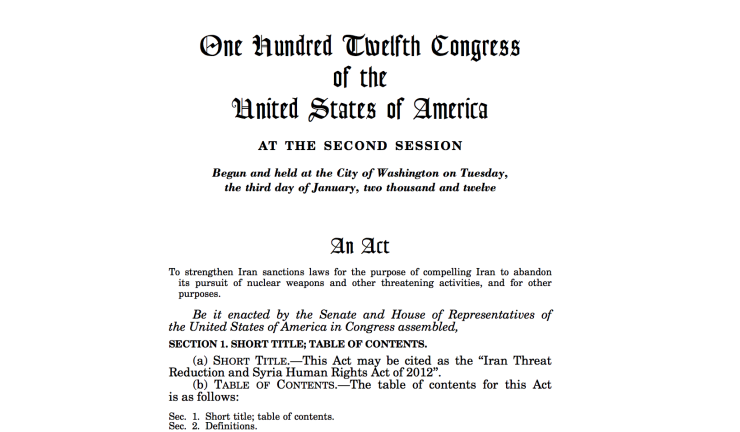The Biggest Question Mark for U.S. Businesses in the Iran Deal
The long awaited nuclear deal between the P5+1 and Iran, née “The Joint Comprehensive Plan of Action” (“JCPOA”), is upon us. So far, the discussion surrounding the deal has predictably focused on the machinations of Congress and whether the agreement is “good” or “bad” deal. Setting aside the folly in reducing an exceedingly complex international arms control agreement to a binary choice, there has been remarkably little insight into what the deal means for the U.S. business community. [UPDATE: After reading through the coverage this morning, its clear I’ve not been entirely fair to the media on this point. Here are some good stories from the Washington Post and Reuters]
There has been passing acknowledgement of the obvious carve-outs contained in the agreement, what our friend Doug Jacobson dubbed the “three Cs”: commercial aircraft, carpets, and caviar. Under the JCPOA, U.S. firms will be licensed to export commercial passenger aircraft and related parts and services to Iran, with “appropriate conditions” to ensure these aircraft are used exclusively for civil aviation. The JCPOA also authorizes the import of Iranian-origin foodstuffs, including pistachios and caviar, as well as carpets.
While these new licensing policies are certainly nice, they do not begin to approach the scale of sanctions relief that European companies will enjoy once the deal goes into effect, likely 6-8 months from now.
But there is one, vaguely written and unexplained section of the JCPOA that will prove to be the make-or-break for the American business community: *cue dramatic music* Annex II, § 5.1.2. Pursuant to this section, the United States commits to:
“License non-U.S. entities that are owned or controlled by a U.S. person to engage in activities with Iran that are consistent with this JCPOA.”
Since the passage of the Iran Threat Reduction and Syria Human Rights Act of 2012, foreign subsidiaries of U.S. companies have been treated as U.S. persons for the purposes of the Iranian Transactions and Sanctions Regulations (“ITSR”). This restriction is codified at 31 C.F.R. § 560.215. Though most U.S. companies had significantly limited their Iran operations even before 2012 due to the tightening sanctions net, in theory this allowed foreign subs to engage in significant Iran business as long as the subsidiary was operating entirely independently of the U.S. parent with regards to its Iran-related activity.
This loophole is how companies like Halliburton, Honeywell, Weatherford, and Schlumberger were able to operate legally in Iran. It should be noted however that, as the Weatherford and Schlumberger cases make clear, the required separation between U.S. and non-U.S. business is often easier said than done.
Unfortunately it’s entirely unclear what § 5.1.2 actually means in practice. It could very well mean a general license or a statement of licensing policy that essentially guts § 560.215. I asked former State Department deputy sanctions czar Richard Nephew for his thoughts and while he didn’t think a general license was in order, he agreed it was not entirely clear
@youbsanctioned don’t see it as a gl. see it as a option for specific licenses so as to not interfere w/ jcpoa imp. In specific cases.
— Richard Nephew (@RNephewCGEP) July 14, 2015
@youbsanctioned I don’t think so. But it merits study, review and discussion with the administration. Complex text. Lots of ins and outs.
— Richard Nephew (@RNephewCGEP) July 14, 2015
A Treasury official quoted by Reuters had a similar response to the question as posed by Reuters: “The scope of the license has to be shaped and determined.”
What this says to me is that the administration is waiting to see how the politics of the deal play out over the coming months. Iran is obviously a toxic issue for many members of Congress, particularly on the Republican side. Allowing significant U.S. trade and/or investment with Iran may only enrage them further. On the other hand, it is possible that some members decide that even if they hate the deal, it makes no sense for the U.S. to lose out to the Europeans in what many are describing as a once in a lifetime market opening.
In contrast to the Cuba opening, U.S. trade associations have remained on the sidelines with regards to the Iran opening, fearing the politics of the issue. But there seems to be a clear opportunity to shape how the administration interprets § 5.1.2 and how much blowback results from that interpretation. So if U.S. companies want a real chance to compete in Iran, it might be time for their lobbyists to get off the sidelines and start making some calls regarding § 5.1.2.


